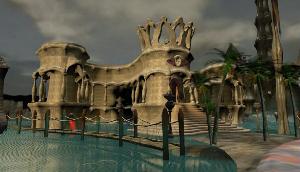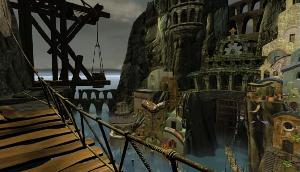A REAH-ality Trip
You’re trapped in an alternate reality and you want to go home. It’s a strange,
myst-ical land, filled with complex puzzles. You are driven
to solve these puzzles in hopes of finding your way back. Does this sound at
all familiar?
Reah is a Myst clone that one-ups the best parts of Myst,
yet leaves most of its weaknesses intact. You play a journalist sent to the
planet, Reah. On this world is a strange portal that scientists have been studying.
You enter the portal just as it closes for all eternity and end up in another
dimension. Your task is to explore this alternate dimension and find a way back
to Reah. The story line feels a little derivitive, but like the games it mimics,
it is really just a device just to take you from puzzle to puzzle.
Artistically,
the graphics are simply breathtaking. Your new dimension is filled with architectural
hybrids full of animated detail creating a dually mysterious yet intriguing
place to wander. Some of the images will just blow you away. Sequences of moving
from spot to spot are animated smoothly with little pixelization. How? The game
fills up a whopping 6 CD’s in order to contain all that animated footage. Reah
is also available in a double-sided DVD version which promises more music and
sharper video.
The music is above average, with an ominous chill to it. However, each section’s
music is looped so it can get pretty annoying after awhile. Sometimes the music
actually gets in the way of sound effects that are necessary to solve certain
puzzles. Irritating.
The voice acting in the game is simply awful. Reah was designed and
programmed in Poland, with the original voices recorded in Polish. English speech
has been dubbed in, but the audio doesn’t sync with the mouth movements. The
english voices don’t sound right either, with exaggerated accents and lack of
intonation. Your character’s voice is dull, piping out the occasional inane
comment (i.e. “Oh how I love puzzles.”). And for some reason, the opening narration
voice sounds like it came from a Monty Python sketch when a more serious voice
would have been a better fit.
The few people that populate this dimension look really out of place. Computer
graphic backgrounds and actors pasted in from a blue screen don’t match right.
Some of the characters even have some blue fog around them; it was either done
to look eerie and mysterious or just a sloppy job of pasting. Plus, their acting
skills are seriously lacking. Some of the actors are also the game’s programmers.
It really shows. The antagonist of the game looks like a pathetic Emperor Palpatine
(from Star Wars… c’mon, get with the program here!) with a moustache; his
face and arms are pasted in, but his cloak is digital. It just looks wrong.
 Many of the puzzles
Many of the puzzles
feel like they were designed for the Mensa elite. If you don’t know what Mensa
is, you might want to pass on this game. The puzzles mostly deal with image
and sound relation, often with some time factor as well. Some puzzles are familiar
pattern matching series — not too tough. Then there is the puzzle where you
must run around the room hitting gongs in a specific sequence, creating a continual
echo. While your massive echo is still ringing, you must hit a glass door in
order to shatter it. If that sounds tougher, then wait ’till you get to the
puzzle where you must turn water faucets in a specific sequence to match tonal
values given to you on an unreadable map.
You can spend hours in the game just walking around, not fully knowing what
to do next. And you can’t proceed until you finish that next puzzle. It can
get frustrating. Sometimes, if you spend too long on certain puzzles, your character
says something cryptic that can clue you into figuring out the answer.
The user interface is easy to understand, but sometimes you must turn to exctly
the right spot before being allowed to walk or look where you have to. And you
never really feel like you’re a part of that world — more like being in a partially
mobile cylinder, allowed to see the pretty art around you.
The ending is sadly disappointing and really brings down the whole experience
of the game. For all your work and cerebral trauma, the ending feels empty and
abrupt. Reah holds true to the idea that the journey is more important than
the goal.
If you’re waiting for that third entry in the Myst series and are willing
to overlook Reah’s faults in exchange for complex puzzles, this game should
tide you over… just. If you’re looking for more of a full-bodied experience
of a game, look elsewhere.







